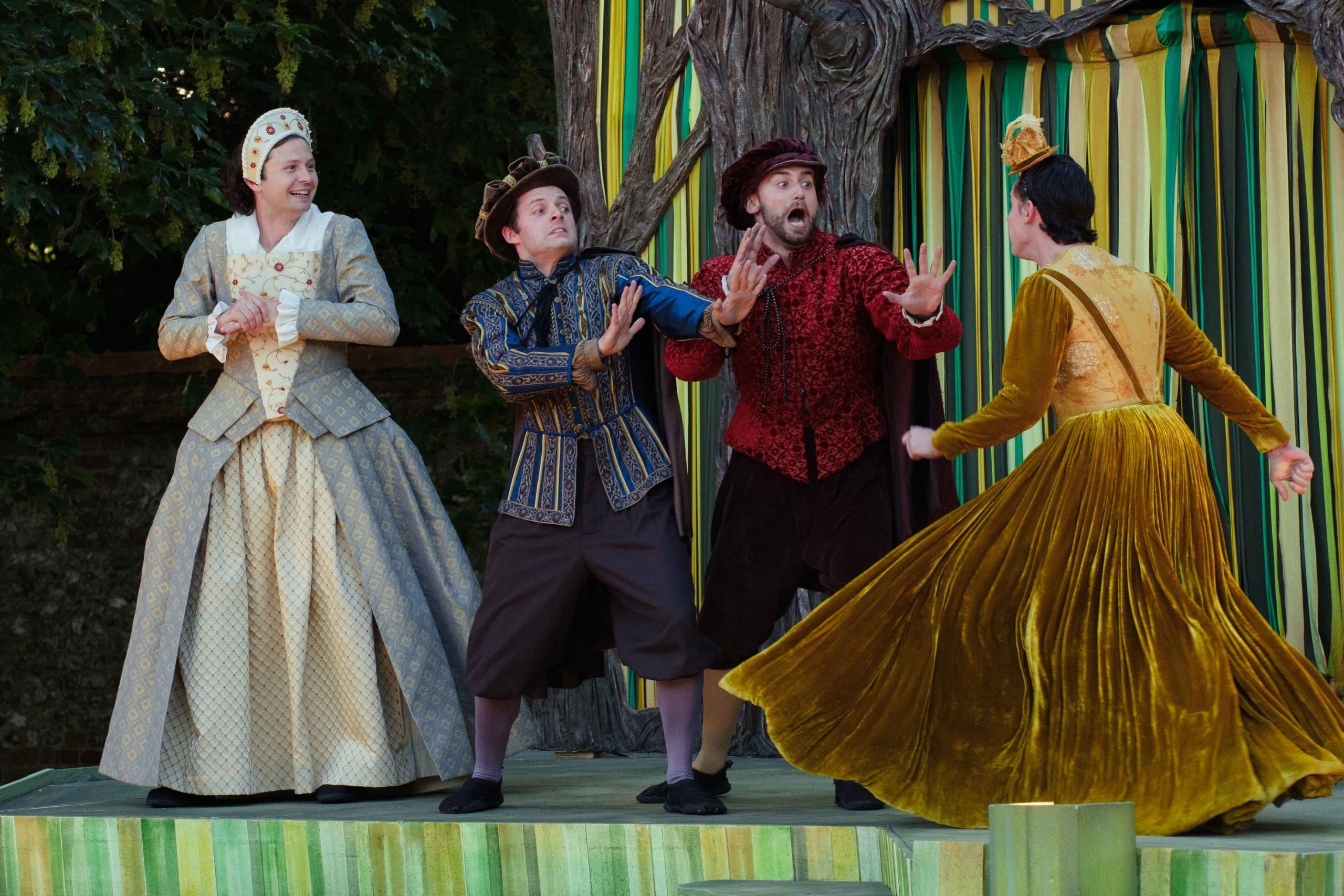
The Lord Chamberlain’s Men celebrate their 15th birthday with this delightful production of A Midsummer Night’s Dream, which they are touring to no less than sixty-nine venues. Brandon Hill, offering a wooded escape from the hustle and bustle of the city, is a particularly apt location. The striking verticals of Morgan Brind’s set, all in yellow and green, were echoed in the magnificent stand of trees beneath Cabot Tower. Director Peter Stickey has created a slimmed-down and swiftly-paced Dream – it’s all over in just two hours – yet there is no loss of intelligibility. Each character is delineated with precision, and how refreshing it is to hear Shakespeare’s lines expressed with such clarity! An open-air performance demands that the actors should turn up the volume, but this talented troupe managed to project their voices across the ranks of camping chairs and picnic baskets without ever becoming unpleasantly shouty.
There may be dark symbolism to delve for in that forest outside of Athens, but A Midsummer Night’s Dream is surely the lightest of Shakespeare’s comedies, and this production straightforwardly focuses on the fun. The show starts with all seven of the cast singing a simple folk song, setting a tone of rustic innocence that is sustained throughout. James Keningale’s Puck is mischievous, but quite without malice. His impishness is that of a young boy, rather than that of a malevolent sprite, and he downplays his magical properties. I liked this interpretation, though there will be those who prefer their Puck’s to be rather more alien. Keningale is also a colourful Philostrate, Master of Revels, and that most unbending of stern parents, Egeus. A striking feature of this production is the speed and dexterity with which the cast change from one character to another, and events behind the scenes must surely be as tightly choreographed as those performed onstage.
The action very quickly moves from the wedding preparations in Duke Theseus’s court to the dark and mysterious forest, where runaway lovers Lysander and Hermia become lost. Alex Wilson is an ardent Lysander, and the scene where he attempts to lie a little too close to Joshua Glenister’s loving but properly coy and cautious Hermia, is carried off with great charm. They are followed into the darkness by the rather fickle Demetrius, whom Egeus has insisted must marry his daughter Hermia. Demetrius, in turn, is followed faithfully by Helena, who is hopelessly in love with him. James Camp’s Demetrius matches Lysander for ardour, but he is less chivalrous. His response to Helena’s advances is a cruel, ‘I am sick when I do look on thee’. Camp delivers Demetrius’s lines with full-throttle relish. It is fitting that, at the end of the play, Demetrius is the only character still under the influence of Oberon’s magic potion, finding himself mysteriously in love with the girl he has spent so much time insulting.
The standout performance of this show comes from George Readshaw, as the lovesick and much put-upon Helena. She is not, perhaps, a character that feminists would warm to, for when she is spurned by Demetrius, she cries, ‘I am your spaniel… The more you beat me, I will fawn on you.’ Even though she embraces victimhood so willingly, Readshaw succeeds in making her more than just a pathetic figure of fun, and he gives real pathos to her bouts of self-criticism: ‘I am as ugly as a bear, for beasts that meet me run away for fear.’
A highlight of the first half is Helena’s showdown with her lifelong friend Hermia, who through Puck’s magical machinations now appears to have stolen Demetrius from her. Hermia may be shorter, but she’s a lot fiercer, and there is some splendid physical stagecraft when Hermia literally launches herself, rocket-like, at the terrified Helena, only to be restrained in mid-flight by the bemused Demetrius and Lysander.
As for the ‘rude mechanicals’, Alex Wilson is a splendidly exasperated Peter Quince, failing utterly to curb the enthusiasm of James Camp’s earnestly incompetent Nick Bottom. I have seen many performances of Pyramus And Thisbe, and all too often the joke goes on too long. This production gets it just right, moonshine, wall and all. There are visual gags aplenty, and Pyramus’s ‘tragic’ end comes about in properly hilarious fashion.
Maximilian Marston is a hearty Duke Theseus and a dignified Oberon, and he is well matched by Will de Renzy-Martin as Hippolyta and Titania. There is a wonderfully moving moment near the end of the play when Oberon and Titania shed their magical garb to become their mortal counterparts, as if the world of dreams and fancies was being set aside.
One does not look for contemporary relevance in A Midsummer Night’s Dream, but on an August day when the Tour de France had been halted by a snowstorm, it seemed fitting that Titania should tell us that the ‘The spring, the summer, The childing autumn, angry winter change their wonted liveries and the mazèd world, by their increase, now knows not which is which.’ Had Shakespeare had a premonition about global warming?
This is a very entertaining, all-male production that well lives up to The Lord Chamberlain’s Men’s watchwords: ‘authenticity, excellence and magic’. Catch it if you can. ★★★★☆ Mike Whitton 27th July 2019


